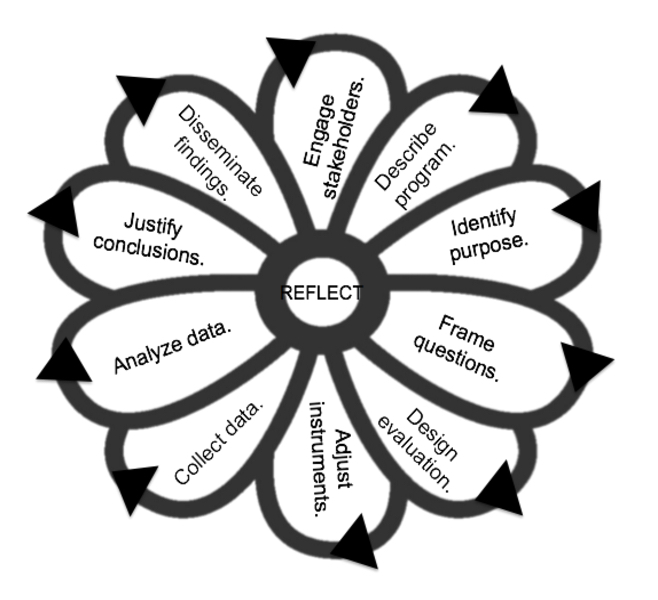We are alumna of the AEA’s Graduate Education Diversity Internship (GEDI) program’s 13th cohort. Today’s hot tips are reflections on the importance of increasing an organization’s capacity to conduct equitable evaluations across all the stages of an evaluation. Here, we will share three tips that we learned while working at our GEDI sites.
Hot Tip #1 (Leah, Doctoral Student at University of Illinois Urbana-Champaign): Develop and utilize critical consciousness to fill the gaps. At my GEDI site, diversity, inclusion and engagement are prioritized in the organization. In developing a measure to capture progress toward this goal, we realized that peer-reviewed research supporting equitable and culturally responsive measures are limited. Most research focuses on staff diversity and work culture but does not account for the various ways spaces can be meaningfully diverse or how people can be included and engaged. One way to address the gap is by increasing critical consciousness, explained by Paulo Freire as “the ability to perceive social, political, and economic oppression and to take action against the oppressive elements of society.” We can then critically analyze the cultural validity of our instruments.
Hot Tip #2 (Monique, Doctoral Candidate at University of Wisconsin-Milwaukee): Make sure reflection is the center of culturally responsive evaluation. During my GEDI experience, I worked with organizations addressing population health outcomes in historically marginalized communities. Following trainings debriefing with program leadership, we concluded that program staff and leadership needed a better understanding of how important reflection is to the culturally responsive evaluation framework. With my site supervisor we conducted a presentation called Tools You Can Use: Program Evaluation for a state foundation’s annual grantee forum. I revised the framework presented by the Centers for Disease Control and Dr. Rodney Hopson on AEA365 to develop The Reflective Flower. This graphic, shown below, centers reflection on the part of the evaluator and key stakeholders. Print this graphic as a reminder to your team and stakeholders of HOW TO BLOOM USING CULTURALLY RESPONSIVE EVALUATION.
Hot Tip #3 (Ibukun, Doctoral Student at Cornell University): Leaders should explicitly commit to culturally responsive evaluation. At my GEDI site, health equity is the organization’s main mission. To assess the organization’s impact on health equity in the community, it is crucial that leaders stay reflective and knowledgeable on health-specific culturally responsive evaluation. The foundation can influence health equity through setting grant project requirements. It is not enough for organizations’ stances and staff members to be committed to CRE; the leaders must also be supportive of these efforts. Ultimately, foundations’ leaders have the unique ability to tackle these issues through their grant-making, as they hold positions of power and have the potential to influence systemic change.
The American Evaluation Association is celebrating Graduate Education Diversity Internship (GEDI) Program week. The contributions all this week to aea365 come from AEA’s GEDI Program and its interns. For more information on GEDI, see their webpage here: http://www.eval.org/GEDI Do you have questions, concerns, kudos, or content to extend this aea365 contribution? Please add them in the comments section for this post on the aea365 webpage so that we may enrich our community of practice. Would you like to submit an aea365 Tip? Please send a note of interest to aea365@eval.org. aea365 is sponsored by the American Evaluation Association and provides a Tip-a-Day by and for evaluators.


I have had the opportunity to explore the AEA365 blog throughout my Program Evaluation course. It has provided meaningful connections, tips and resources for me as I explore evaluation. I wanted to respond to your post on Evaluating Equity, Diversity and Inclusion in Organizations. This article stood out to me because it highlighted an important aspect of evaluation.
Firstly, I appreciate that these tips came from your experiences at GEDI sites as this provides context to your insights. I appreciate that you’ve undertaken such a contentious issue as I have found that in Education, equity and diversity can sometimes be misunderstood. Your article not only notes the current practice of some organizations but reveals gaps and then proposes a strategy for implementation. For example, Leah Peoples notes that the organization lacked the inclusion and engagement of individuals and proposed that they understand and take action against oppression.
I especially appreciate the reflection piece that Monique mentioned. The Reflective Flower is a wonderful visual for program implementers to see how to implement a culturally responsive framework and most importantly, that reflection is at the core of this practice.
Certainly, leadership is equally important to an organization as they are the role models and hold much influence. Ibukun affirms that a leaders role is critical for real change to be made within an organization. And that they are to lead the way in reflective and active cultural responsiveness.
Thank you for your insights and for your tips and tools. You have deepened my understanding of equity and diversity as it relates to evaluations. Look forward to reading more!